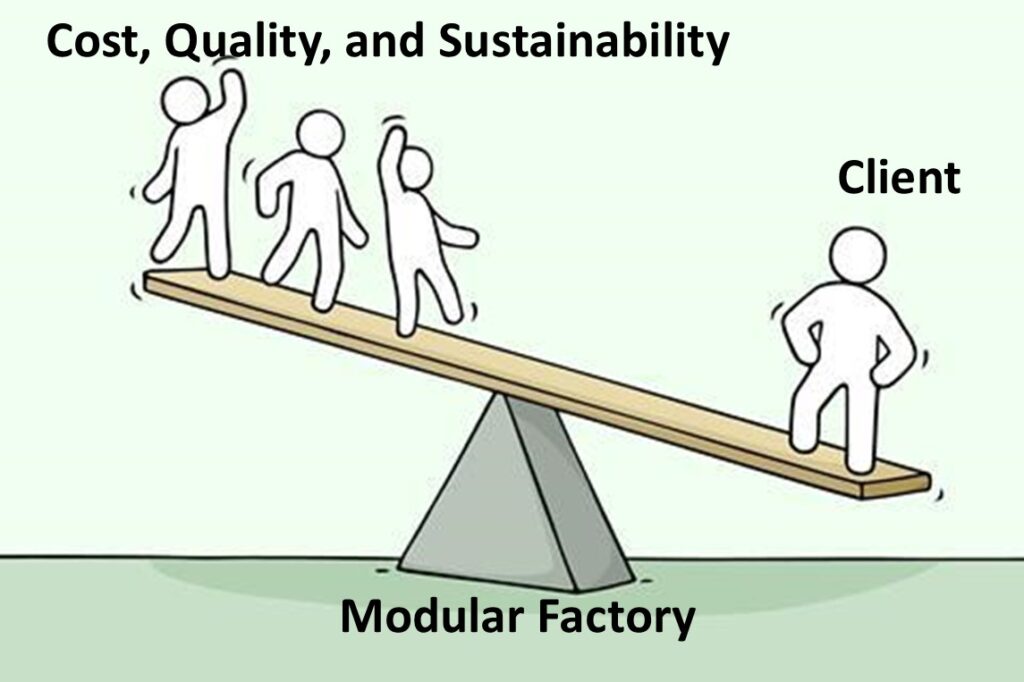Entrepreneurship is often seen as a brave endeavor, driven by passion, innovation, and the unrelenting pursuit of a dream. But the road from concept to execution is fraught with challenges—especially in industries like modular construction, where the gap between vision and reality can be much wider than anticipated. Despite the brilliance of their ideas, many innovative entrepreneurs find themselves unprepared for the complexities of transforming their concepts into viable businesses. What makes the journey so difficult? Is it a lack of support or financing, or do they fail to anticipate the pitfalls of bringing their ideas to life?

This is a soul-searching exploration of why so many innovative entrepreneurs struggle to get their businesses off the ground, especially in modular construction. More than a mere lack of resources, the root causes of failure run deeper, tied to an underestimation of reality, overconfidence in innovation, and the unpredictable challenges of the market.
The Chasm Between Vision and Reality
Entrepreneurs are often visionaries, driven by a burning desire to disrupt industries and introduce new ways of doing things. In modular construction, the promise is alluring: faster building times, greater cost-efficiency, and the potential to solve housing shortages. But the gap between concept and execution is vast. Entrepreneurs envision streamlined production lines, homes being built faster and cheaper than ever before, and the market clamoring for their solutions. Yet when it comes time to break ground on their factory, they often face unexpected complexities.

Modular construction, unlike other industries, requires seamless integration of multiple moving parts—design, fabrication, transportation, assembly, and finishing. Any disruption along the chain can lead to costly delays, production bottlenecks, or quality issues. Many entrepreneurs underestimate the intricacies involved, focusing too much on their innovation without understanding the operational realities. Their dream of revolutionizing the construction industry gets bogged down in the nitty-gritty details of regulatory compliance, factory setup, and managing construction timelines.
The Weight of Operational Complexities
To the uninitiated, starting a modular factory may seem straightforward: secure a space, hire a team, and begin production. But the reality is far more complex. Running a factory—particularly one that relies on precision engineering, high-quality craftsmanship, and timely deliveries—requires extensive knowledge of logistics, production flow, and labor management.

Many entrepreneurs find themselves caught off guard by these challenges. As the factory floor comes to life, they face issues like sourcing skilled labor, managing supply chains, and ensuring quality control. Modular construction is not just about innovation but about execution at every level. It’s about the synchronization of production, transportation, and installation. When one aspect falters, the entire operation suffers. Entrepreneurs, enamored with their innovations, may fail to prioritize these operational essentials, leading to delays, cost overruns, and, ultimately, failure.
Financial Hurdles: The Unseen Cost of Innovation
Financing is often seen as one of the most significant obstacles for entrepreneurs, and for good reason. Modular construction startups are particularly capital-intensive. Beyond the initial costs of setting up a factory, entrepreneurs must secure working capital to cover labor, materials, equipment, and the often-lengthy timeline before any significant revenue is generated. Additionally, many entrepreneurs fail to account for the long payback periods associated with modular construction projects. Cash flow becomes a critical issue as expenses accumulate, and the return on investment may take years to materialize.
But the financial challenges don’t end with securing startup capital. Entrepreneurs must also navigate the operational costs of scaling production, investing in new technology, and dealing with the inherent fluctuations in demand. Too often, they underestimate these financial realities, and what began as a promising venture quickly spirals into insolvency as cash reserves dwindle.
The Isolation of Innovation: Lack of Support and Mentorship
In the modular construction industry, innovation can feel like a lonely road. Entrepreneurs often struggle to find mentors or industry veterans who understand their vision or are willing to guide them through the process. Unlike tech startups, which benefit from extensive ecosystems of investors, advisors, and incubators, the modular construction space is still relatively niche. Entrepreneurs find themselves navigating uncharted territory, making critical decisions with little outside input.
This lack of support can be devastating. Without experienced mentors to help them anticipate challenges or avoid common pitfalls, entrepreneurs may take missteps that prove costly. The reality is that success in modular construction requires more than a great idea—it requires a deep understanding of the industry and the practicalities of execution. For many entrepreneurs, this learning curve proves too steep to overcome without the guidance of those who have walked the path before them.
The Seduction of Innovation: Overconfidence and Misjudgment
Innovation is intoxicating. Entrepreneurs, brimming with enthusiasm for their groundbreaking ideas, often believe they are on the verge of revolutionizing their industry. They pour their energy and resources into refining their product or process, convinced that the market will eagerly embrace their innovation. But too often, this overconfidence leads to a fatal misjudgment: they neglect to consider how resistant the market can be to change.
In modular construction, where tradition runs deep, many factory owners and builders are reluctant to adopt new technologies or processes. The upfront costs, training requirements, and perceived risks associated with innovation create a barrier to acceptance. Entrepreneurs may fail to anticipate this resistance, finding themselves with a product or service that, while innovative, struggles to gain traction in the market. Overconfidence blinds them to the reality that innovation alone is not enough—successful integration into the industry requires patience, strategic partnerships, and often a slower, more methodical approach than they initially envisioned.
Regulatory Nightmares and Compliance Complexities
Another hidden challenge that blindsides many entrepreneurs is the regulatory landscape. Modular construction is heavily regulated, with building codes that vary from region to region. Obtaining permits, ensuring compliance with local laws, and meeting stringent safety standards can be a time-consuming and expensive process. Entrepreneurs often underestimate these regulatory hurdles, and failure to comply can lead to delays, fines, and even project shutdowns.
Navigating this bureaucratic maze requires experience, persistence, and a detailed understanding of the law. For entrepreneurs new to the industry, these compliance challenges can prove insurmountable, particularly if they do not have the right advisors or legal counsel in place.
The Burden of Expectations and the Reality of Failure
Finally, many entrepreneurs struggle with the emotional toll of unmet expectations. They enter the industry full of hope, inspired by stories of success and eager to make their mark. But the harsh realities of operational complexities, financial challenges, and market resistance can quickly erode their confidence. Failure, when it comes, feels personal—a reflection of their shortcomings rather than the formidable challenges of the industry.
This emotional burden can be the hardest to bear. Entrepreneurs pour their hearts, minds, and resources into their ventures, only to find themselves confronting the possibility that they may not succeed. For many, the realization that starting a modular factory requires far more than they ever expected is a bitter pill to swallow.
Modcoach Note
In the end, the struggles faced by innovative entrepreneurs in modular construction are not due to a lack of vision or passion. Rather, they are the result of an underestimation of the complexities involved in bringing their ideas to life. Success requires not just innovation, but realism, resilience, and a willingness to learn from the challenges that arise. For entrepreneurs, the path forward lies not in avoiding these challenges but in confronting them head-on, armed with the knowledge that every setback is a step closer to realizing their dream.
.
CLICK HERE to read the latest edition
Contact Gary Fleisher












